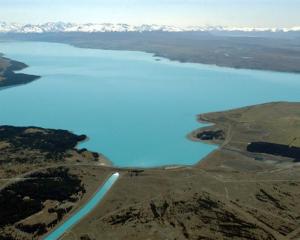Ms Irving, who was recently made a partner in Dunedin law firm Gallaway Cook Allan, works in the firm's resource management and environmental law team.
At 29, she is the youngest partner in the firm and also the only female partner based in the Dunedin office. Felicity Hayman is a partner based in Wanaka.
Originally from Feilding, where her parents had a fertiliser contracting business which they have since sold, Ms Irving completed both law and science degrees.
That coincided with Gallaway Cook Allan looking for a resource management graduate, a position which Ms Irving said was ''right up her alley'', and she joined the firm in November 2007.
Ms Irving enjoyed her work, saying it was a very interesting and exciting time to be a resource management lawyer.
The regulatory landscape was changing, particularly with pending changes to the Resource Management Act and various district and regional plan reviews under way.
Recent changes to the regional plan regarding water would continue to ''loom large'' over the rural sector, while new regulatory responses to issues such as natural hazards had significant implications for urban centres.
By virtue of her rural background, agribusiness was a sector she had some understanding of and found very interesting.
There was a wide variety of work and issues and it involved working with some very interesting people, she said.
Significant issues facing the rural sector over the next few years included the Otago Regional Council's 6A water-quality plan change and the expiry of old mining licences in 2021.
Water was a very valuable commodity in Central Otago and she believed the discussion in that region, and also Queenstown Lakes, would be not so much around water quality but landscape and amenity.
A lot of people, irrespective of water-quality issues, said they did not want to see ''a whole lot of centre pivots and green grass'' in a part of the country where they were used to seeing tussock and dry grass, she said.
So with the development of dairying, in areas where people would never have anticipated seeing it five or 10 years ago, she believed there would be a slightly different issue, created by the same development.
In relation to plan change 6A, Ms Irving had been acting for farming clients, local councils and some industrial stakeholders.
It had been a ''pretty significant process'' and how it played out in practice was yet to be seen.
Hopefully, if everyone kept an open mind and worked together, something useful would be achieved, she said.
She did not think anyone disagreed with the proposition that good water quality should be achieved. It was more of a question of how to do that, over what time frame and perhaps to what level.
Ms Irving enjoyed site visits, as well as the likes of taking part in a community planting day in the Pomahaka catchment in October, to improve the habitat for fish.
Laughing and describing herself as ''probably a bit of an oddball'', having never left Dunedin, she knew when she was near the end of her tertiary studies that she did not want to be in one of the bigger cities.
The idea of ''jumping on the treadmill'' at a big firm did not appeal to her and she was fortunate the job at Gallaway Cook Allan arose, she said.
Her husband, Jesse Teat, an electronics designer, was finishing his masters degree, and that helped in their decision to stay in the South.
He has since started his own business, an electronics design company called Tussock Innovation.
At Gallaway Cook Allan, the firm was a ''reasonable size'' and there was an opportunity to specialise and become involved in some quite significant projects, she said.
There was also an ability to get actively involved with clients in a way that would not happen in bigger firms.
Being made a partner was an exciting opportunity.
''I still kind of can't believe it,'' she said.
Outside of work, the couple led active and busy lives. Work could be a ''pretty high-pressure environment at times'' and it was good to have things to ''give you a bit of an outlet and put things back in perspective'', she said.
They spent time in Wanaka, where Mr Teat's family was from, doing a lot of mountain biking and skiing.
Mr Teat represented New Zealand in the 2002 Winter Olympics in Salt Lake City in the giant slalom and slalom events.
Ms Irving was a keen multisport participant and competed in the Challenge Wanaka half ironman event earlier this year, while the couple's dog, Oscar, got the couple out walking every day.
She was proud to have been a founding member of the Dunedin Young Professionals group which celebrated its fifth anniversary earlier this year.
It came about when a group who had been together at university, although not necessarily close friends, commented on a ''sense of isolation'' they felt.
''Most people don't stay here after uni. All of a sudden, it seems all of your friends have disappeared.
''One of the messages you get quite early on in your career is your success, or otherwise, is based very much on your ability to build relationships, meet people and build networks,'' she said.
The group decided that an organisation needed to be put together to allow people a way of doing that and there had been ''wonderful'' support from the business community.
It averaged about 250 members, holding a variety of events each year, ranging from business development events through to social functions.
Ms Irving, who stepped down from the committee this year, described the initiative as having been a ''great success''.
Among the Young Professional group's members there was a wide range of people, from lawyers, accountants and bankers, through to engineers and small business owners, which had made the group a lot more interesting.
She believed one of the reasons it had endured was that those attending saw real benefit in meeting a broad range of people.
Ms Irving was also a trustee of the Dunedin Tunnels Trail Trust, which hoped to develop a cycle and walking trail from the centre of Dunedin through to the Taieri Plains via the two old rail tunnels at Caversham and Chain Hills.
''I have a fair bit going on.
''You've got to pick things you're interested in,'' she said.
She was happily settled in Dunedin and the plan for the future was to keep building relationships with people and keep on helping people out.
''At the end of the day, what we try and do is make our clients' lives easier.
''And, if we can do that, they'll keep coming back,'' she said.












